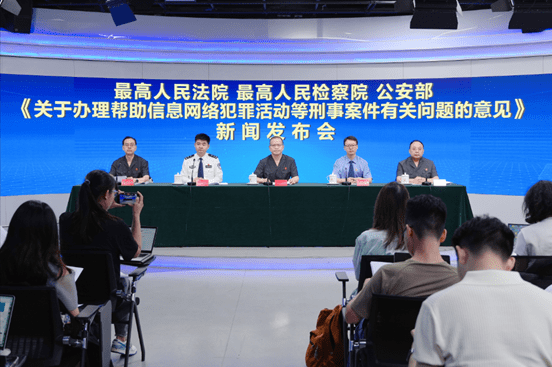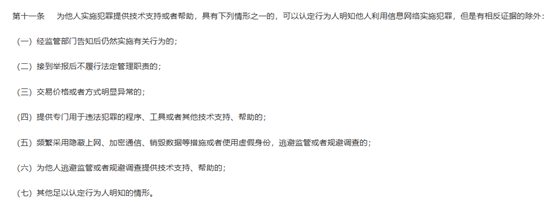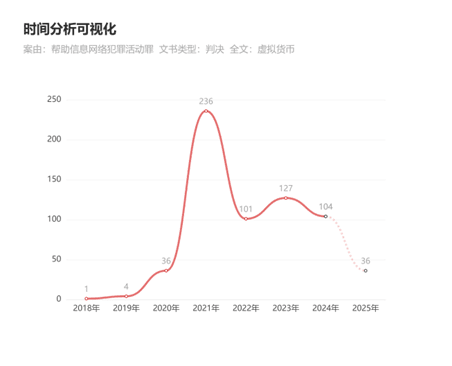Introduction
On July 28, 2025, the Supreme People's Court, the Supreme People's Procuratorate, and the Ministry of Public Security (hereinafter referred to as the 'two high authorities and one ministry') jointly held a press conference to release (Opinions on handling issues related to aiding information network crime activities) (hereinafter referred to as '(opinion)'), which provided more detailed regulations on the composition of crimes related to aiding information network crime activities, leniency, and mitigating circumstances.

Among them, a clause will significantly impact the crypto circle, especially those engaged in virtual currency trading (such as US merchants and others).
1. What did the (opinion) say?
(I) Background of the issuance of the (opinion)
Cybercrime, represented by telecommunications network fraud, has begun to develop continuously in depth, with the 'running score platforms' and other black and gray industries around telecommunication fraud, online gambling, and pyramid schemes continuously growing.
In fact, judicial authorities, including the 'two high authorities and one ministry,' have previously issued separately or jointly:
(Opinions on several issues concerning the application of laws in handling telecommunications network fraud and other criminal cases) (Jointly issued by the two high authorities and one ministry, Fa Fa [2016] No. 32);
(Opinions on several issues concerning the application of laws in handling telecommunications network fraud and other criminal cases (II)) (Jointly issued by the two high authorities and one ministry, Fa Fa [2021] No. 22);
(Opinions on several issues concerning the application of criminal procedure laws in handling information network crime cases) (Jointly issued by the two high authorities and one ministry, Fa Fa [2022] No. 23);
(Opinions on several issues concerning the application of laws in handling cross-border telecommunications network fraud and other criminal cases) (Jointly issued by the two high authorities and one ministry, June 26, 2024)
(Interpretation by the Supreme People's Court concerning the application of laws in handling criminal cases related to concealing or hiding criminal proceeds) (Supreme Court, Fa Shi [2021] No. 8);
(Interpretation concerning the application of laws in handling criminal cases related to illegal use of information networks and aiding information network crime activities) (Supreme Court, Supreme Prosecutor's Office, Fa Shi [2019] No. 15);
These regulations specify the composition of crimes related to telecommunications fraud (fraud), aiding crimes (aiding information network crime activities), and concealment crimes (concealing, hiding criminal proceeds, and income from crimes), especially the presumption rules for the actor's 'subjective knowledge' in aiding and concealment crimes.
However, the complexity of social activities cannot be fully covered by one or several judicial interpretations or criminal policy documents. For example, the emergence of virtual currency has made traditional money laundering methods (such as underground banks) visibly decline. Due to the inherent lag in judicial activities, it is difficult for laws and regulations to immediately regulate illegal activities involving virtual currencies.
Even with provisions like judicial interpretations, although relatively flexible, they cannot rashly impose criminal penalties on certain behaviors due to the constraints of the criminal justice's restraint requirements and the principle of legality in crime and punishment. Taking the aforementioned (Interpretation concerning the application of laws in handling criminal cases related to illegal use of information networks and aiding information network crime activities) as an example, its Article 12 states that under the premise of 'knowing that others are committing crimes using the information network and providing assistance for their crimes,' having any one of the following behaviors constitutes aiding crime: '1. Providing assistance to three or more objects; 2. Paying settlement amounts of more than 200,000 yuan; 3. Providing funds of more than 50,000 yuan through advertising, etc.; ... 7. Other circumstances that are serious.'
What are the other serious circumstances? Is there a relatively uniform judgment standard in practice? In addition, there is also a catch-all clause in the aforementioned Article 11, Item 7, stating 'other circumstances sufficient to determine that the actor knew,' what is the recognition standard for this 'other sufficient'? Practices vary.
Thus, the (opinion) has finally been issued, providing more precise guidance on the application of aiding crimes in recent years.
(II) Specific content of the (opinion)
(The opinion) consists of five parts with 16 items. We will only discuss the core sections:
First, the catch-all clause of Item 7 of Article 11 of the (explanation) concerning 'other circumstances sufficient to determine that the actor knew' has been explicitly defined:
1. Illegal provision of devices for bulk insertion of phone cards, illegal provision of devices and software that change the caller's number, virtual dialing, and illegal access to public telecommunications networks over the Internet, illegal provision of bulk accounts, automatic switching systems for network addresses, platforms for receiving SMS verification, and voice verification in bulk;
2. Continuing to engage in related behaviors after being restricted or suspended by financial institutions, telecommunications operators, or Internet service providers due to fraud-related or other abnormal circumstances.
3. Preparing scripts in advance to respond to investigations.
Secondly, regarding the catch-all clause of Article 12, Paragraph 1, Item 7 of the (explanation) concerning other serious circumstances, Lawyer Liu (web3_lawyer) will not elaborate further.
Third, clarify the criminal policy of 'balanced leniency and severity.' For example, those who organize and utilize minors, students, and the elderly to commit crimes (aiding crimes) should be punished severely; however, those who are deceived into committing crimes (also referring to aiding crimes), have a short participation time or earn little, or are minors or students involved can be dealt with more leniently, etc.
2. How does the (opinion) affect the crypto circle?
As an author who often 'self-promotes' as a web3 lawyer in articles and videos (in reality, also handling quite a few cases in the crypto circle), Lawyer Liu will definitely start analyzing the impact of the issuance of (opinion) on the crypto circle.
First, in summary, the (opinion) will not have a very obvious and strong impact on the low-key and shrinking domestic crypto circle.
Secondly, from a detailed perspective, the (explanation) has already regarded the behaviors shown below as a standard for presuming that the party 'knew' that others were committing crimes using the information network.

In fact, the content of the screenshots has covered many 'seemingly routine but actually high-risk' actions in the crypto circle: for example, trading virtual currencies at prices significantly lower or higher than the market; also using encrypted communication software like Telegram or Bat. These behaviors will be recognized as abnormal by judicial authorities, although I believe this regulation may not be reasonable, practice is based on this standard.
Finally, from a micro perspective, the (opinion) considers the following behaviors as standards for presuming the actor's subjective knowledge:
Continuing to engage in related behaviors after being restricted or suspended by financial institutions, telecommunications operators, or Internet service providers due to fraud-related or other abnormal circumstances.
Objectively, it has added a layer of constraints on the increasingly shrinking domestic crypto circle.
If you are involved in 'fraud-related' factors due to trading virtual currency (for example, receiving fraud funds when cashing out), and banks, telecommunications companies, and Internet platforms (excluding overseas virtual currency exchanges) freeze (stop payment) your bank card, restrict your calling or texting functions, or your WeChat/Alipay account is banned, and you continue trading virtual currency, and unfortunately encounter 'fraud-related' factors again, then, I’m sorry, you may be suspected of aiding crimes.
To give another straightforward example: if Zhang San receives stolen funds due to buying and selling virtual currency and has his bank card (or WeChat, Alipay) frozen, and continues to buy and sell virtual currency while receiving dirty money, then according to Chinese criminal law, it can be presumed that Zhang San 'knew' that others were committing crimes using the information network and (intentionally) provided assistance.
3. Suggestions for practitioners in the crypto circle
On the AlphaLawyer platform, the author searched for 'aiding information network crime activities' using 'virtual currency' as a keyword and found that in the past five years, the number of judgments and development trends of aiding crimes are roughly as shown in the figure below.

However, it should be particularly noted that since 2021, the number of court judgments published online at all levels of the country has significantly decreased, so the above image cannot fully and objectively display the true information regarding virtual currency-related aiding cases. My personal judgment is that the number has been continuously increasing or at least relatively stable since 2021.
For practitioners in the crypto circle, in a general direction, it can be foreseen that the future crypto ecology in mainland China will only become more closed and difficult; in practical operations, the author suggests that everyone can legally hold their virtual currency, but when wanting to cash out, they must be extremely cautious. If one inadvertently receives stolen funds, especially fraud-related funds, it is best to completely avoid cashing out in mainland China in the future.
